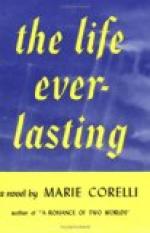Suddenly there came a change over the face of what I thought the sky—the clouds were torn asunder as it were to show a breadth of burning amber and rose, and I beheld the semblance of a great closed Gateway barred across as with gold. Here a figure slowly shaped itself,—the figure of a woman who knelt against the closed barrier with hands clasped and uplifted in pitiful beseeching. So strangely desolate and solitary was her aspect in all that heavenly brilliancy that I could almost have wept for her, shut out as she seemed from some mystic unknown glory. Round her swept the great circle of the heavens—beneath her and above her were the deserts of infinite space—and she, a fragile soul rendered immortal by quenchless fires of love and hope and memory, hovered between the deeps of immeasurable vastness like a fluttering leaf or flake of snow! My heart ached for her—my lips moved unconsciously in prayer:
“O leave her not always exiled and alone!” I murmured, inwardly— “Dear God, have pity! Unbar the gate and let her in! She has waited so long!”
The hand holding mine strengthened its clasp,—and the warm, close pressure sent a thrill through my veins. Almost I would have turned to look at my companion—had I not suddenly seen the closed gateway in the heavens begin to open slowly, allowing a flood of golden radiance to pour out like the steady flowing of a broad stream. The kneeling woman’s figure remained plainly discernible, but seemed to be gradually melting into the light which surrounded it. And then— something—I know not what—shook me down from the pinnacle of vision,—hardly aware of my own action, I withdrew my hand from my companion’s, and saw—just the solemn grandeur of Loch Coruisk, with a deep amber glow streaming over the summit of the mountains, flung upward by the setting sun! Nothing more!—I heaved an involuntary sigh—and at last, with some little hesitation and dread, looked full at Santoris. His eyes met mine steadfastly—he was very pale. So we faced each other for a moment—then he said, quietly:—
“How quickly the time has passed! This is the best moment of the sunset,—when that glory fades we shall have seen all!”
IX
DOUBTFUL DESTINY
His voice was calm and conventional, yet I thought I detected a thrill of sadness in it which touched me to a kind of inexplicable remorse, and I turned to him quickly, hardly conscious of the words I uttered.
“Must the glory fade?”—I said, almost pleadingly—“Why should it not remain with us?”
He did not reply at once. A shadow of something like sternness clouded his brows, and I began to be afraid—yet afraid of what? Not of him—but of myself, lest I should unwittingly lose all I had gained. But then the question presented itself—What had I gained? Could I explain it, even to myself? There was nothing in any way tangible of which to say—“I




